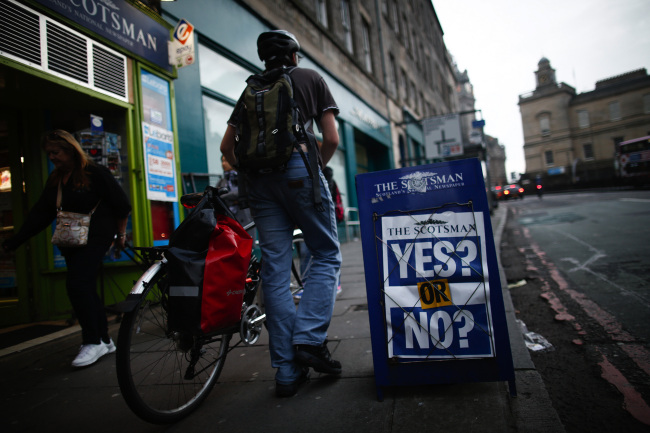Recently, a referendum was held in Scotland on whether it should become independent of the United Kingdom, or if it should stay in the union.
After years of campaigning from both sides and after a contest so close that it was difficult to predict the outcome, the majority in Scotland voted “Yes” to stay with the United Kingdom.
The referendum might not have resulted in the breakup of a union that have lasted centuries, but it did change the political landscape of the United Kingdom tremendously.
The Scottish independence referendum was closely watched by many all over the world, including Malaysia.
After years of campaigning from both sides and after a contest so close that it was difficult to predict the outcome, the majority in Scotland voted “Yes” to stay with the United Kingdom.
The referendum might not have resulted in the breakup of a union that have lasted centuries, but it did change the political landscape of the United Kingdom tremendously.
The Scottish independence referendum was closely watched by many all over the world, including Malaysia.

We would all be somewhat familiar with the mechanism of a referendum; a question is put to the voters and the voters choose one of the answers provided.
What many may not realize is that the Scottish independence referendum was established by way of an Act of the Scottish Parliament known as the Scottish Independence Referendum Act 2013.
The Act provides for matters such as eligibility of voters for the referendum, tallying of the votes, campaigning and offences.
An Act of the Scottish Parliament needs to be passed because the United Kingdom does not have a written constitution. The U.K. is no stranger to referenda.
Referenda have been held for alternative voting systems, devolution and membership in the European Union, amongst others. The framework for each individual referendum must be set up by way of legislation.
In other countries, the mechanism for referendum is in built within the constitutional framework. In Australia, for example, the constitution provides that certain constitutional amendments must go through a referendum first.
Most referenda are initiated by the government. But countries such as Switzerland also allow referendum to be initiated by the populace.
The ban on minarets in Switzerland was the result of a referendum initiated by a group of people in the country.
Referendum is an important democratic mechanism. Modern democratic systems are representative in nature, where citizens elect representatives to the lawmaking body so that these representatives can represent them.
A referendum is a form of direct democracy in which citizens can give their input on a particular issue, instead of going through a representative.
There are several advantages with having a referendum. A referendum can help re-engage voters with political issues.
For example, the Scottish independence referendum has realigned voters in Scotland with politics, when before this; there was a general apathy throughout U.K. that resulted in lower voter turnouts.
A referendum can empower the people. They will feel that they have direct input on certain issues.
A referendum can also become the starting point for debates and discourse, such as what has happened with Scotland after the Scottish independence referendum.
A referendum is also useful to resolve political problems, which cuts across party lines.
The government will get a better feel for contentious issues such as membership of an international organization, or entering into a potentially disadvantaged international trade agreement with another country, by way of referendum.
A referendum also provides an opportunity to obtain direct mandate on certain issues, especially midway through a government’s term in office and which does not form part of its manifesto during the elections.
Direct mandate should also be obtained from voters when constitutional amendments are proposed, so that it would not be so easy for the constitution to be changed.
What would it take to introduce referendum to Malaysia? It really depends on what type of referendum we are looking at.
Projek Beres, the electoral reform collective made out of Malaysians local and abroad proposed three types of referenda ― mandatory referendum, citizen initiated referendum and government initiated referendum. Their proposal would require constitutional amendments.
Projek Beres proposed that for certain constitutional amendments, as well for the continuation of legislation enacted under Article 149 of the Constitution after one year, a mandatory referendum must be held to put the question to the voters.
The federal or state governments may themselves initiate a referendum. Also, just like Switzerland, a citizen may initiate a referendum if he is supported by at least 10 percent of the voters.
These are just proposals and are not set in stone. Realistically, we will not see referenda in Malaysia anytime soon. There is no political will or demand from the people for referenda. But we need to start talking about referendum, a norm in more matured democracy.
The democratization of Malaysia has steadily progressed over the past years. In line with this, it is time that we look at referendum as another step toward empowering the rakyat (people).
By Syahredzan Johan
(The Star)








![[Kim Seong-kon] Democracy and the future of South Korea](http://res.heraldm.com/phpwas/restmb_idxmake.php?idx=644&simg=/content/image/2024/04/16/20240416050802_0.jpg&u=)









![[Today’s K-pop] Zico drops snippet of collaboration with Jennie](http://res.heraldm.com/phpwas/restmb_idxmake.php?idx=642&simg=/content/image/2024/04/18/20240418050702_0.jpg&u=)